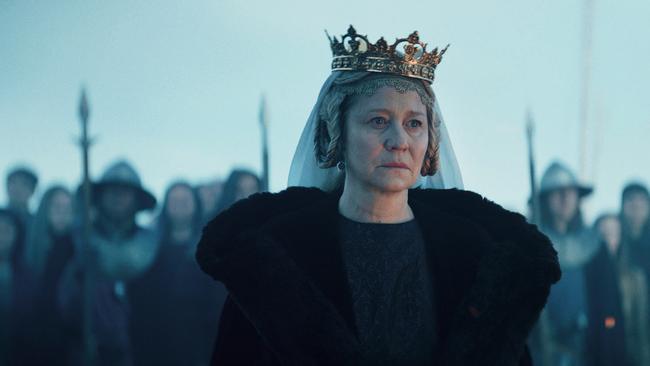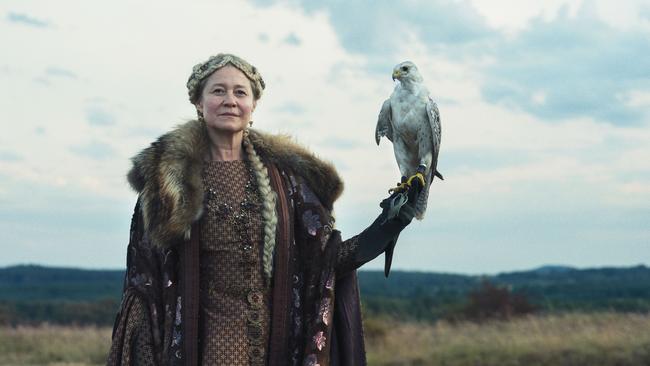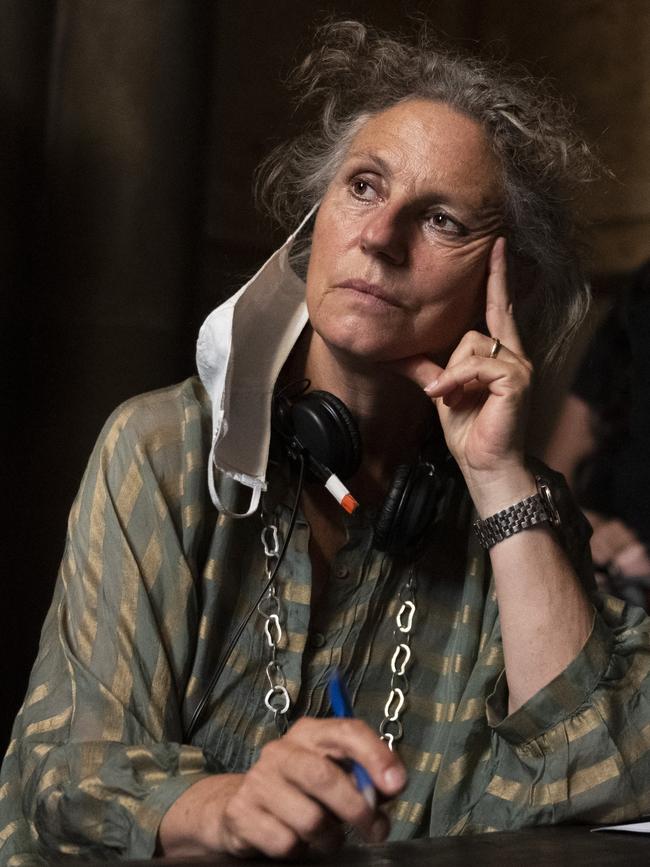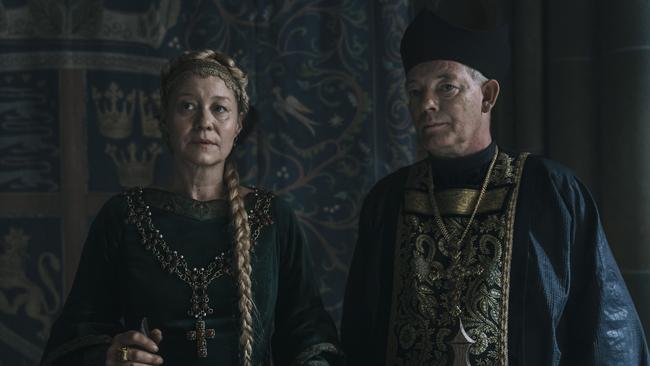Plastic surgery ‘is like cutting your tongue out’
Film director Charlotte Sieling attacks our ‘sick society’ for pressuring women to go under the knife, as she launches her film about a largely forgotten Danish queen

Margrete I was one of Scandinavia’s most astute rulers. Born in Denmark in 1353 in a prison where her father, King Valdemar, had thrown her mother, she would go on to unite previously warring nations Denmark, Norway and Sweden.
She forged this alliance, known as the Kalmar Union, in 1397, and it ushered in a period of peace and prosperity among the Nordic nations that lasted for more than a century.
Yet Charlotte Sieling, director of the new feature film, Margrete: Queen of the North, says her medieval subject remains a relatively obscure figure, even in her native Denmark. Speaking over Zoom, Sieling tells Review: “It (her legacy) is not taught in Danish schools. So many people don’t even know who she was, even though the queen we have now is called Margrete II. It’s crazy. That’s why we made the movie. There should be statues all over of her. Instead, we have two small statues outside of Copenhagen.’’
Margrete: Queen of the North is loosely based on a real mystery that threatened to unravel the Nordic union and the reign of a woman who was ahead of her time. Given its success to date, this historical epic is likely to boost the profile of the half-forgotten royal in Denmark and beyond.
Sieling has worked on internationally lauded Scandi crime dramas, including Unit 1, The Killing and The Bridge, and has directed episodes of top-rating American shows Homeland and The Americans. Margrete: Queen of the North is her third film and was nominated for 13 awards in the 2022 Danish Film Academy’s Robert Awards. With a $US10m ($15m) budget, it is the most expensive movie produced by that country.
The historical epic opens in Australia on November 24 and features some of Denmark’s best-known actors. Trine Dyrholm (Festen, Love Is All You Need) portrays the queen who places peace and political stability above all else, until she is faced with a dilemma that pits her head against her heart. The Killing’s and Borgen’s Soren Malling plays Bishop Peder, Margrete’s quietly Machiavellian adviser, while rising star Jakob Oftebro won a Robert Award for his intense performance as a young man who throws the royal court into chaos by claiming to be the queen’s long-dead son.

The saga opens in 1361 on a Swedish battlefield strewn with corpses and gravely wounded men. It jumps forward to Norway in 1402, as Margrete juggles the conflicting demands of the now-united Nordic countries with aplomb and reminds them: “In war, there are no winners.’’
With thick blond braids cascading down her shoulder and looped across her forehead, Dyrholm’s queen is quietly commanding, even though she must rule through her adopted son, King Erik, because she is a woman. She doesn’t throw public tantrums, and in a 21st-century style feminist gesture, rescues a kidnapped sex slave from pirates.
She is about to betroth King Erik to a young British princess, because an alliance with the English would fend off invasion threats from the Germans. At this delicate juncture, the stranger who claims to be King Oluf (Oftebro), and the true heir to the throne, turns up.
Margrete must confront an agonising dilemma: She did not see her biological son’s body when he died 15 years before. Could this interloper really be her flesh and blood, or is he an impostor who should be executed for undermining the Nordic union?
Critics have described Dyrholm’s performance as “masterfully understated” and Sieling agrees. “Oh totally,’’ she says breezily, “because I made her do that. It was actually in the beginning a big battle, because Trine is a modern actress who’s very dynamic in her body language, so I had to really take it away from her.’’
Dyrholm’s Margrete is a handsome, middle-aged woman who wears minimal makeup. Sieling has bracing views about actors who go under the knife, arguing this is a sign of a “sick society”. “If you cut your face, your skin is an organ and it’s a communicative organ. We communicate with words but we communicate even more with the way the skin, an organ, moves,’’ says the former stage and screen performer, placing her hands on her face and tugging at the skin.
“As an actor, why would you do that to yourself? It’s like cutting your tongue out or your eyes. It’s just a sick society that asks women to do that, to be ashamed of our age, and we have to talk about that.’’ The 62-year-old mother-of-two feels her daughter’s generation is “stronger” in this regard than her peers.
As for Malling – whom Sieling directed in The Killing, Borgen and in her 2017 film, The Man – she admits she promised him the role, only to give it to another actor. She offered it to Malling again after the other performer dropped out following 11th-hour script changes.
Malling, she says brightly, “was a bit annoyed by me promising the part and giving it to another one, but I finally got him to say yes and I am so happy that it was him’’. She regularly works with the performer because “there’s a chemistry that works and we can really have some battles that never break us. We can really challenge each other. I think he’s an amazing actor.’’

Margrete: Queen of the North was shot in the Czech Republic and evokes a medieval Nordic world of bruised skies and seething seas, with a cold wind whistling relentlessly through Margrete’s castle. It alternates between epic landscape and battlefield shots and intimate scenes – conspiracy theories bloom like mushrooms in the shadowy corners of the queen’s court.
Many historians have concluded that “false Oluf’s” claim to the throne was a conspiracy designed to destabilise Margrete’s reign. However, Sieling, who co-wrote the film, uses this event to inject ambiguity and emotional conflict into her narrative. “It’s where we can make the big story into the very narrow story about her heart,’’ she says.
The writer-director says historical documents that could explain how the Oluf incident played out are missing or were not preserved. “There’s so much missing stuff and stuff that was never taken care of,’’ she says.
Sieling started her career as an actor in the 1980s and 90s, performing for the Royal Danish Theatre in roles including Ophelia and in the Swedish miniseries Rosenbaum (1993) and Love Me, Love Me Not (1995). Her pivot to directing wasn’t planned, although she is now regarded as one of Denmark’s foremost television directors. “I started out as an actor who was lost a little bit, so I started to direct. I didn’t know I was going to be a director. It just happened,’’ she says. She worked in Danish TV during its early 2000s drama renaissance. “So when I went to the US I knew exactly what to do, actually. The notable difference was the big budgets, which was so much fun.’’
She believes the golden age of Danish TV — with shows such as The Killing and Borgen winning fans and plaudits from around the world — was partly driven by producers recruiting talent from film and theatre. “All of a sudden, television was the thing to know about and to do. I think it was the momentum of people who were excited about making television that was more than television, really a kind of movie television.’’

Interestingly, her last film, The Man, has a similar plot twist to the one that animates Margrete: Queen of the North. In The Man, an abandoned son turns up out of the blue, provoking personal and professional crises for his father, a self-indulgent artist played by Malling. The son was played by Oftebro, and she says that for “both movies (Margrete and The Man) he got the Danish prize for best supporting actor’’. To prepare for the historical film, he talked to psychologists about how “being imprisoned for 15 years would feel for a person’’. She says he was “so fragile” and so prepared when he arrived on set, he required minimal direction.
Her next film, The Way Home, again centres on a parent-child relationship, and is set against the “terrible stories” of Danish involvement in the Syrian war. “I think it (parent-child relationships) is very much my theme,’’ she says. “Maybe just the connection. It’s maybe just the fact of, how do we cope with our kids and how do we cope with our parents?’’
Asked about the challenges of shooting a large-scale film like Margrete: Queen of the North, she replies: “I guess it was the number of days; we were in a hurry.’’ She had worked on the script for years and had only been filming for 10 days in March 2020 when the production was abruptly shut down because of the coronavirus pandemic. The months-long delay proved costly, forcing the film’s producers to raise an extra $1.7m from different backers.
Despite this, she says: “I cannot say it was difficult. We were in the situation where we actually had a very good script we had been writing for six years; I had the most amazing lead, who was totally inspired by the script … Every day was a challenge in terms of reinventing what the script was offering us, but it was one of those challenges that you as an artist really want to have.’’
Margrete: Queen of the North, is released nationally on November 24.


To join the conversation, please log in. Don't have an account? Register
Join the conversation, you are commenting as Logout